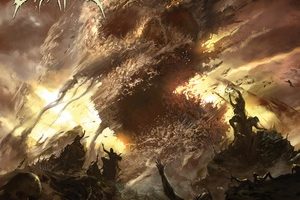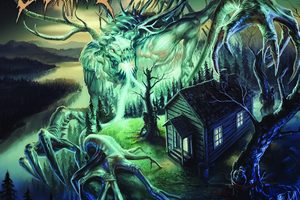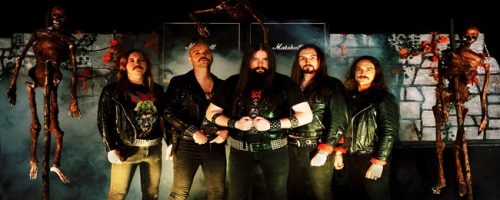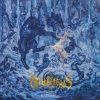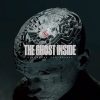Cognitive – Rising From the Depths
Sunday, 25th July 2021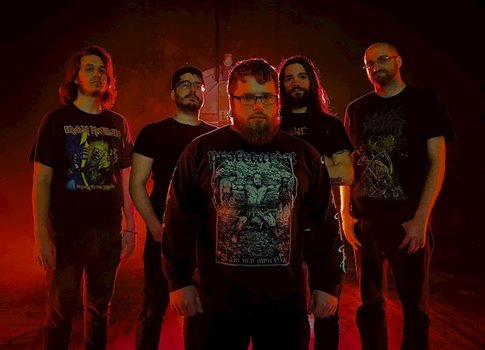
An ever evolving and growing force within the death metal community, Cognitive have been providing a death metal experience that is multi-faceted and intriguing. With their newest album, it seems people are finally starting to ‘get it,’ and there couldn’t be a better time. Malevolent Thoughts of a Hastened Extinction showcases Cognitive at their absolute best. Bludgeoning, technical, and always memorable. We hit up guitarist Rob Wharton for some talk about the album, growth of the band, and some discussion about the reopening of tours.
Dead Rhetoric: What kind of established you, early on, towards the path of heavy metal?
Rob Wharton: When I was really little, my sister was really into Led Zeppelin. My mom used to take me to soccer games, and god bless my mom, somehow she would put on the radio stations that had Alice in Chains, Soundgarden, and all of the grunge stuff that was on at the time. I discovered Metallica and that was the heaviest, greatest thing ever. Then Slayer and all of that stuff. One day I discovered God Forbid’s Determination and Dillinger Escape Plan’s Calculating Infinity. After that it was Dying Fetus’ Stop at Nothing to Cephalic Carnage’s Lucid Interval. So it was like an avalanche after that!
Dead Rhetoric: Malevolent Thoughts of a Hastened Extinction is the new album. What do you feel that Cognitive has tweaked or changed for this album?
Wharton: I just feel like we have matured in terms of songwriting. We didn’t do anything different than most people during the pandemic. We wrote the album remotely, like a lot of bands, since we weren’t getting together and jamming. We were just sending each other files back and forth. We are always on the road, and with no shows, it allowed us to really take our time and worry about ‘this and that,’ and I think it paid dividends for us as much as it did suck to not be out on the road – we miss playing and all. I think that it did help with the songwriting and focus.
Dead Rhetoric: In terms of the album then, COVID was a benefit in that you could flesh things out and do exactly what you wanted.
Wharton: We were trying to get songs done before we would go out on tour and slot time for the album, but then something else would pop up and we couldn’t say no to, so this made it like, ‘we’ve got nothing but time to worry about it.’ Now we are already trying to get some rough ideas for new material, because now that things are starting to pick back up, we want to tour as much as we can for the album. But since we will be on the road, we figured we should start writing.
Dead Rhetoric: Do you feel that Cognitive has been building itself up towards this release, in terms of the way that the band has grown and evolved?
Wharton: More than anything, I am proud that I feel this release has gotten more attention than anything we have done previously. I think it has gotten a lot more eyes on it. After all the touring we have done – we will go out by ourselves if we have to or take some smaller bands with us. In that year before COVID, we had gotten a lot of support slots and that made it easier for us to see that we are growing, and with the record coming out, it is showing that people had their eyes on us from tours. I feel like it has all paid off. I’m thankful for anything we get. I’m thankful if 10 people or 10,000 people hear us. But its definitely flattering when you can see that people really care now.
Dead Rhetoric: I kind of feel like Cognitive has been one of those undiscovered gems in a sense. You have so much stuff going on if you listen to death metal, it should be an easy fit for a lot of people, but somehow up to this point there hasn’t been as many eyes on you, so that’s great to hear.
Wharton: Dude, trust me – I’m humbled to hear that, and we feel the same way. Sometimes it’s like, “I’m shocked that we didn’t catch on – we do some cool stuff!” But it’s cool that with this record, people are saying “Yo, this band does cool stuff that I like, how come I never heard them before?” So they can see that we have four prior records and it’s cool to see people catching on.
Dead Rhetoric: With all of the different bits and pieces from within the extreme scene, what do you feel is important when you write songs, to help make the band stand out?
Wharton: It’s weird, because I listen to so much death metal! I listen to a lot of non-death metal stuff too – I’m a big Muse fan as well as Leprous and Thrice. I try to hear ideas in that and put it into a death metal take. There’s so many subgenres of death metal. To me, even early deathcore like The Red Chord, Animosity, Despised Icon – I thought that shit was awesome! They really brought different elements into it. So that stuff finds its way into the music. I love Meshuggah! I’m a big Dillinger and Ion Dissonance fan, and to me, that stuff has a place in death metal too, without having to be just an extreme math metal band or djent band. I feel like there are ways that you can incorporate it all in.
Dead Rhetoric: I really like the way you said that with taking something and put it through a death metal lens. I think a lot of bands get stuck in ‘I gotta play death metal’ instead of broadening the horizons and putting stuff through a death metal filter.
Wharton: We all have these different bands that we like, even in pop music. We can hear things and say, “oh that would be cool if someone did that in a death metal take.” But I feel like from the beginning of the band that we established we could do stuff like that. If a band like Cannibal Corpse did that, it wouldn’t be Cannibal Corpse. Cannibal Corpse is your meat & potatoes band and if I want that, I am going to go listen to Cannibal Corpse because they will give me my meat & potatoes. I’m glad that we set the pace as a band that would try more abstract stuff outside of just blastbeats and stuff.
Dead Rhetoric: Yeah, I’m thinking that there was even a bit more melody in some of the songs this time as well.
Wharton: Our guitar player Harry [Lannon] really wrote more than he ever has before and it was a big help. I think that shined through on the record as well.
Dead Rhetoric: In terms of bands you look up to, are there bands that are doing a great job in terms of either their professionalism in the live scene or the way they handle social media?
Wharton: There are so many good ones! Cannibal Corpse is the top. They are one of the first death metal bands, they always bring it, and they can pack a venue which is hard to do for a death metal band. But they can pack serious people in serious venues. A band like Whitechapel – they bring the production, the stage show, and very professional and made a career out of it. I think Inferi does a great job with their social media. They always have content coming out. Dying Fetus is another great band. They are no-frills and just come out to bring it. Meshuggah and Dillinger Escape Plan both have two of the best live shows I’ve seen live. I hope we can get to the point where we can bring that kind of stuff to the stage – full production and lights show, because I thought that would be always be cool for us. I think Rivers of Nihil does a really good job too. There are so many other bands out there, but those are the ones that first come to my head now.
Dead Rhetoric: With “To Feed the Worms,” it was mentioned that there was a Legacy of Kain influence. What are some other games that filter their way into the band, or some general favorites?
Wharton: Halo actually found it’s way into “The Maw.” Our bass player and vocalist are big Halo fans so that song is about the parasitic flood from Halo – taking over someone’s body and all that. I don’t know if it will happen on the next record or not, but they found their way in on this record which was cool. I used to love Legacy of Kain when it came out. I’m not a Halo guy but I was all about the way that Tyler [Capone-Vitale] stepped up and wrote the lyrics.
Dead Rhetoric: I think there is a lot of tie-in you can do at this point between the metal and gaming communities.
Wharton: There are so many games that are dark and would fit in with metal. I don’t think its so far-fetched and that’s why you see so many bands do that now. It makes sense.
Dead Rhetoric: You have several releases out now. What are the goals that you are at for where you want Cognitive to be?
Wharton: I just want us to keep growing and pushing ourselves forward, gaining new fans, and advancing musically – whether the riffs are harder, the songs having better structure, or just trying some off the wall stuff. I think the goal now is to get out on the road and get on tour with the bigger bands. We are really crossing our fingers that we can hit some charts with this one. I don’t know if it’s going to happen, and if it doesn’t that’s fine, but I’m appreciative of all the good reviews and I just want to see us keep growing and moving ahead.
Dead Rhetoric: What’s death metal to you, at this point in your life?
Wharton: It’s everything! I love it. I try to help bands book tours or point them in the right direction to get on a fest. Most of my friends are involved in the community, and I love the music. I think it’s awesome. It’s super important to me.
Dead Rhetoric: You mentioned the promotion angle – do you feel that you learn things that you can apply to Cognitive by doing the management side of things for other bands?
Wharton: I feel like it’s more like I learn from my own band and then can help other bands sometimes. Sometimes it’s like you said and vice versa. The whole reason I got involved with that was from being out on the road and wanting the help myself. Especially when you first start out – you say yes to every show and then you ask yourself why when you drove the next city over that we play in to play again and we could have saved that time to write and blew the money at the bar that could have went into the band. Just small things that add up. Not that I know everything about that stuff, because I’m still trying to figure it out myself. I am not the seer of all things and don’t have the answers. But I wish I had some of my knowledge now when we first started out.
Dead Rhetoric: What would you say would be the biggest thing when you started that you know now and wish you knew then?
Wharton: Buy a van with less miles on it [laughs]! That’s what I would tell myself.
Dead Rhetoric: Do you have any concerns coming out of the lockdown and shows starting back up? Do you feel that there’s a way that things need to be done properly, or worried about the flooding of tours?
Wharton: There’s so much I’m worrying and so much I’m excited about. A big concern is that things start, bands will be out on the road and the tour is cancelled. Or a band member gets it – you won’t be able to play a show for a week or two. I don’t have all the answers. I was very pro-mask and I didn’t do anything during COVID and got vaccinated – all that. But I don’t have the answer for this stuff, I just hope people are going to be smart and safe. If you aren’t going to get the vaccine, please wear a mask if you come to a show maybe. But I don’t make the rules. I feel for everyone in the industry. They need to start making money and booking tours. They need to get venues open again. I don’t know the right answer to any of this – a year and a half without music, as a musician it killed me and as a fan of music it killed me. I love going to shows. If we aren’t playing shows, I want to be at a show. I want to see my friends succeeding and I’m hoping everything will continue to get better so everything moves forward and the industry can get back to normal.
Dead Rhetoric: What’s the plan for Cognitive for the rest of the year now?
Wharton: I think we are going to start looking for tours in the fall. That’s about it right now. We have some stuff for next year but we are going to see how these tours go in the fall. Hopefully we will be able to start committing to things and getting out there. We cancelled four tours last year. We are eager to get out there, but we don’t want to jump into it and have things get cancelled or moved around again. It’s not good. Other than that, promoting, working, and saving up.













